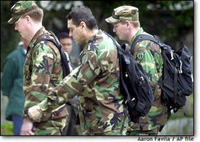U.S. troops leave Pakistani earthquake zone
The last U.S. troops are pulling out of an earthquake shattered region of Pakistan nearly six months after America rushed in medical teams and humanitarian aid. But it's unclear whether the goodwill the response fostered will last. Gen. Peter Pace, chairman of the Joint Chiefs of Staff, told The Associated Press on Monday that he believes more Pakistani people have a favorable opinion of the United States because of the earthquake assistance.

"I do believe that the Pakistan people have recognized a side of the American people they heretofore did not have a chance to see in person," said Pace, who is making his first visit to the impoverished country. He flew over the earthquake devastated region Tuesday, his helicopter skimming across mountains as Pace looked down a panorama of flattened homes.
Tents, tarp-covered houses and wooden frames hinted at the start of reconstruction efforts here and there. Afterward, Pace visited a refueling unit and met with several Pakistani military leaders who briefed him recovery efforts.
The United States has provided more than US$218 million in relief so far as the effort moves from relief to construction. Ryan Crocker, the U.S. ambassador to Pakistan , told reporters the U.S. will provide an additional $200 million over the next several years "to not just rebuild, but to build back better."
Defense Secretary Donald H. Rumsfeld has also said he believes the humanitarian response helped improve relations with the Muslim and Arab worlds. Others, though, say that impact may be exaggerated. "The earthquake relief is quickly forgotten," Rachel Bronson, director of Middle East studies at the Center for Foreign Relations, said in a recent interview. "The anti-Americanism runs so deep that even positive efforts can be spun against the U.S. "
Instead, she said, negative events resonate. Bush tried to emphasize the earthquake assistance during a recent trip to Islamabad . But the U.S.-led wars in Iraq and Afghanistan are unpopular in Pakistan , and thousands of people demonstrated against Bush during his visit.
" Pakistan is far away and it's not Arab," Bronson said. "The positive things we do in Pakistan don't register that loudly in the Arab world." Pace said in the Monday interview that he has seen polls that show the Pakistanis have a higher opinion of the U.S. now.
"It was a human tragedy and we had the capacity to help and we did," he said. "Regardless of what the polls say, it was the right thing to do. I'm glad we did it. I'm glad we were able to ease the suffering for thousands of Pakistanis whose lives were devastated."
Pace is in Pakistan for meetings with military and state leaders, and to mark the withdrawal of the last U.S. troops that have spent a half year providing earthquake aid. At its peak the U.S. had 1,200 personnel there, including hospital units, mobile construction battalions and other transport and relief units. Humanitarian flights delivered food, medical equipment and other supplies.
The remaining 260 U.S. military troops are expected to be out of Pakistan by early April. The country was devastated by a 7.6 magnitude earthquake last Oct. 8 that killed more than 80,000 people. The disaster also left about 3 million people homeless in the mountainous region, reports the AP.
N.U.
Subscribe to Pravda.Ru Telegram channel, Facebook, RSS!


